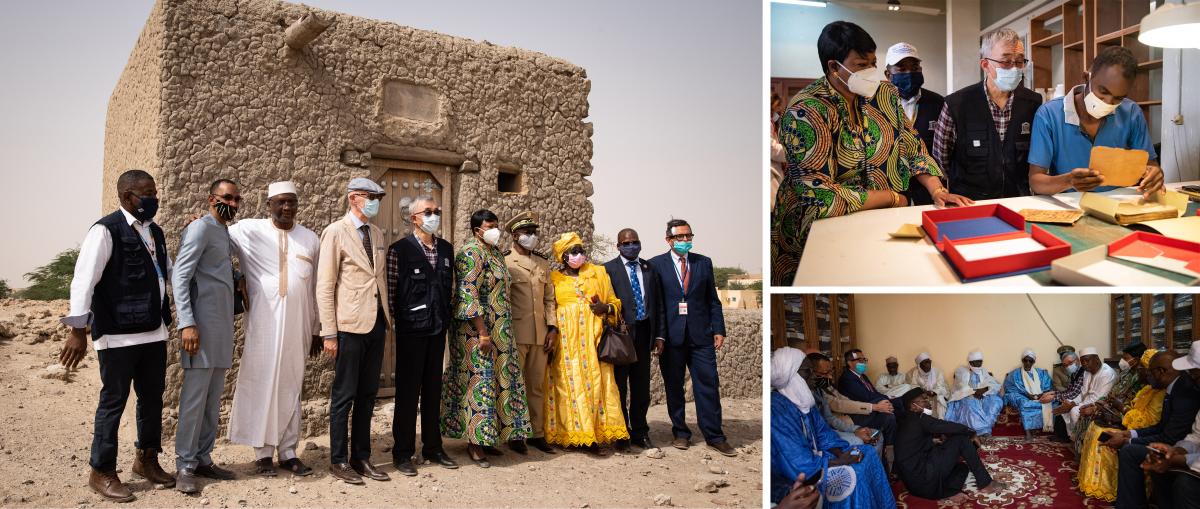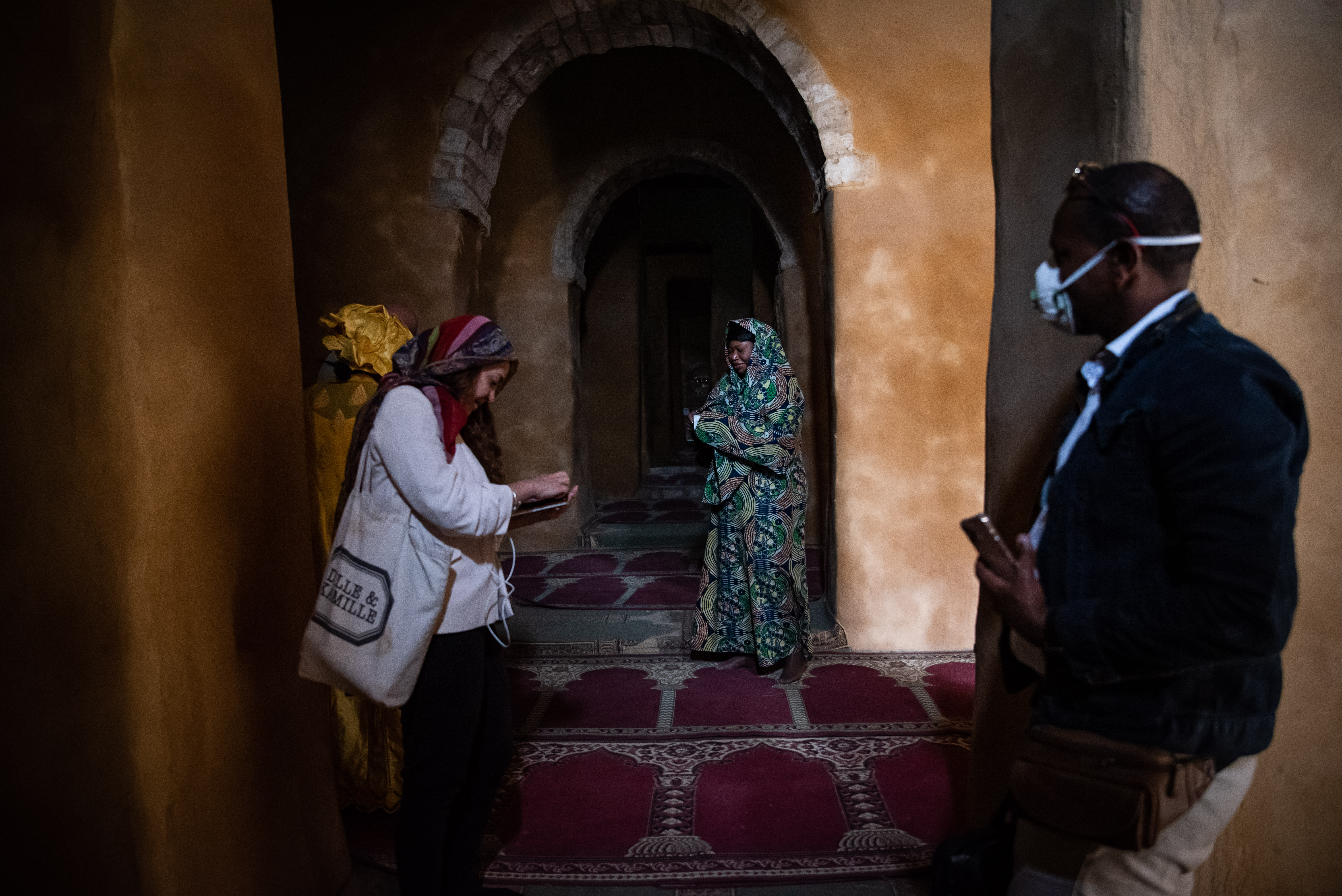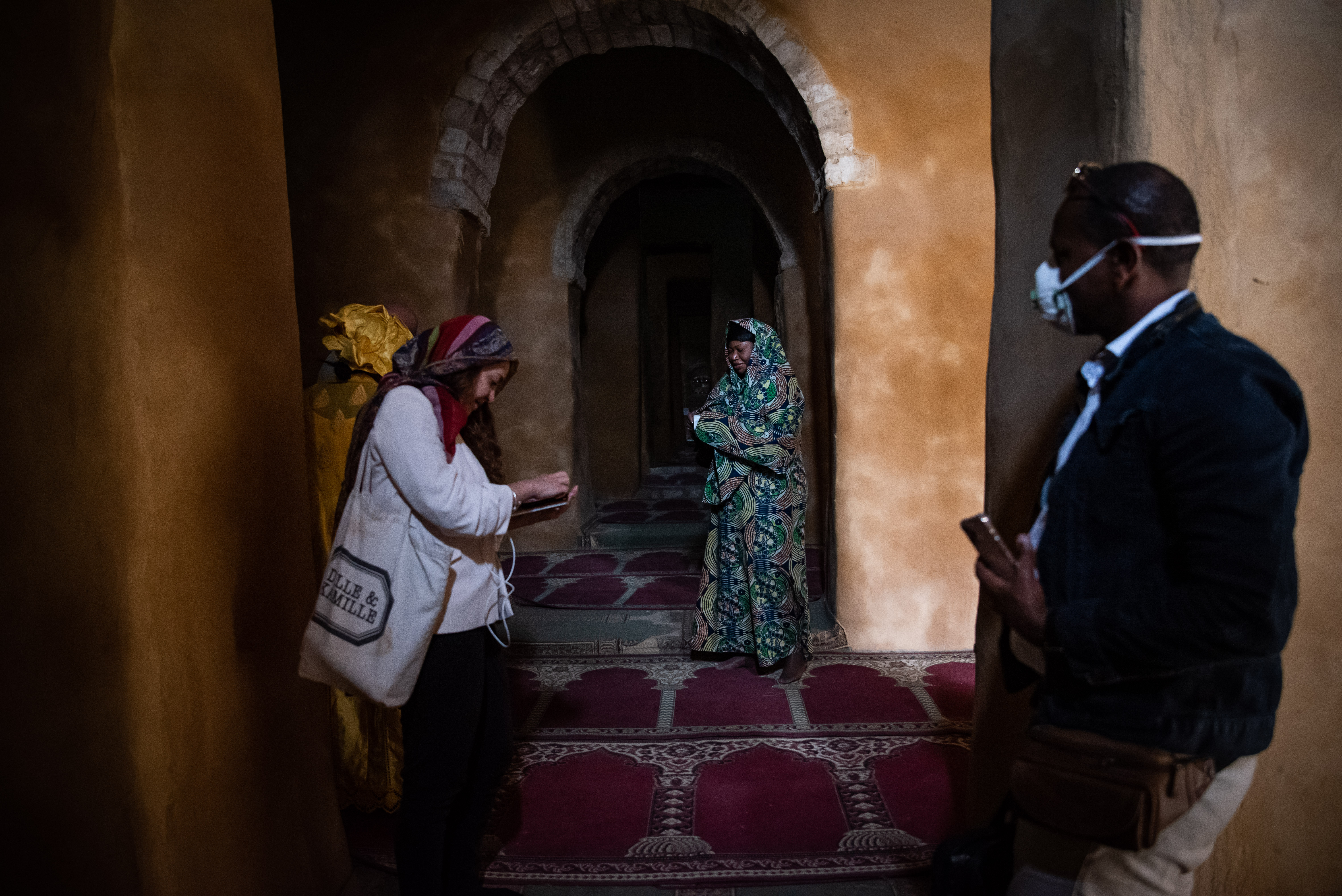Statement by ICC Prosecutor, Fatou Bensouda, at the conclusion of her visit to Mali: “Cultural heritage must no longer be attacked and destroyed with impunity.”

From the 29th to the 31st of March, I had the honour to conduct my third and last official visit to Mali in my capacity as Prosecutor of the International Criminal Court ("ICC" or the ''Court'') before my term ends in June of this year. While in Mali, my delegation and I had a full
programme of meetings and productive discussions with the Malian authorities, the judiciary, representatives of civil society, victim associations, community and religious leaders, the academic community and the media. Our exchanges also included meetings with representatives of the United Nations and the diplomatic community based on Mali.
I would like to express my sincere gratitude to the Malian authorities, and the President of the Transition, H.E. Bah N'DAW for the hospitality and cooperation extended to me and my team during my visit to Bamako and Timbuktu.
I would also like to thank the Trust Fund for Victims of the ICC as well as The United Nations Educational, Scientific and Cultural Organization ("UNESCO") for the organisation and gracious invitation to take part in the
historic ceremony marking the symbolic recognition of victims – their suffering, their courage and resilience – following the conviction of
Mr Ahmad Al Faqi Al Mahdi, the first individual accused and convicted at the ICC for the war crime of intentionally directing attacks against religious and historic buildings in Timbuktu, Mali. Mr Al Mahdi was sentenced to nine years imprisonment and ordered to pay 2.7 million euros in reparations to victims. His conviction sent a clear message that these are serious crimes under international law and that perpetrators must be and will be held accountable. Cultural heritage must no longer be attacked and destroyed with impunity.
As I stated at the ceremony, when cultural property is destroyed, it erases the past, never to be lived again, leading to an irreplaceable loss to humanity. We must pool our resources and within our respective mandates, collectively address the serious issue of the destruction of cultural heritage in war and conflict. No actor alone is able to effectively fight impunity for atrocity crimes and protect cultural heritage. Joint action and collaboration are essential. We must indeed #unite4heritage.
Given the importance that I, along with my Office, attach to this matter, and in line with my
Strategic Plan to pay particular attention to crimes against and affecting cultural heritage, we recently published a
Draft Policy on Cultural Heritage for consultation and comments by States Parties to the Rome Statute, civil society and other stakeholders. My Office has enjoyed
close collaboration with UNESCO on this initiative, and I seize the opportunity to publicly salute them for their critical work and the cooperation and assistance extended to my Office. We look forward to our continued collaboration.
In our second case in the Situation of Mali, the trial against
Mr Al Hassan Ag Abdoul Aziz Ag Mohamed Ag Mahmoud has been ongoing since last July. Mr Al Hassan faces a total of 13 charges of crimes against humanity and war crimes, including sexual and gender-based crimes and the deliberate attacks against cultural heritage allegedly committed in Timbuktu. He is the first individual at the ICC to be charged with persecution on the grounds of gender and on religious grounds. The attack on cultural heritage is part of the underlying crimes.
My Office will continue to do what it can to address these serious crimes, including the assault on cultural heritage – our common heritage. My personal visit to Timbuktu on this occasion and having directly interacted with community leaders and those affected by the destruction brought upon this historic city have only reinforced my belief in the importance of accountability for such crimes. History, whose physical embodiment is at peril through such attacks, will not be generous to our failure to care or act decisively.

During my visit, I have also discussed with the Malian authorities the ongoing violence in the country, and in particular, the preoccupying situation in central Mali and the need to ensure that investigations by the Malian authorities are conducted as swiftly as possible and that those responsible for the commission of atrocities against the civilian population are brought to justice. I reiterated the commitment of my Office to provide support as appropriate in conformity with our mandate and the principle of complementarity to assist national efforts to investigate and hold accountable those responsible for atrocities.
Our investigations in Mali continue. I am grateful to the Malian authorities for their cooperation and support. My Office remains committed to doing everything it can within its mandate and means to advance justice for victims of atrocity crimes, whether at the ICC or in support of national efforts within the framework of complementarity.
The Office of the Prosecutor of the ICC conducts independent and impartial preliminary examinations, investigations and prosecutions of the crime of genocide, crimes against humanity, war crimes and the crime of aggression. Since 2003, the Office has been conducting investigations in multiple situations within the ICC's jurisdiction, namely in Uganda; the Democratic Republic of the Congo; Darfur, Sudan; the Central African Republic (two distinct situations); Kenya; Libya; Côte d'Ivoire; Mali; Georgia, Burundi; Bangladesh/Myanmar, Afghanistan (subject to a pending article 18 deferral request) and Palestine. The Office is also currently conducting preliminary examinations relating to the situations in Bolivia; Colombia; Guinea; the Philippines; and Venezuela (I and II); and has recently completed its preliminary examinations of the situations in Ukraine and Nigeria, which are pending requests to seek authorisation to proceed to investigation.
في الفترة من 29 إلى 31 آذار/مارس، تشرفتُ بإجراء زيارتي الرسمية الثالثة والأخيرة إلى مالي بصفتي المدعية العامة للمحكمة الجنائية الدولية (''المحكمة'') قبل انتهاء ولايتي في شهر حزيران/يونيه من هذا العام. وفي خلال وجودي في مالي، كان لديّ أنا وفريقي برنامجاً كاملاً من الاجتماعات والمناقشات المثمرة مع سلطات مالي، والقضاء، وممثلي المجتمع المدني، وجمعيات المجنيّ عليهم، وزعماء المجتمعات المحلية والزعماء الدينيين، والدوائر الأكاديمية، والإعلاميين. وقد تضمنت أنشطتنا المشتركة أيضاً اجتماعات مع ممثلي الأمم المتحدة والدوائر الدبلوماسية الموجودة في مالي.
وأود أن أعرب عن خالص امتناني لسلطات مالي، وللرئيس الانتقالي، السيد باه إنداو، على حسن الضيافة وعلى تعاونهم معي ومع فريقي في خلال زيارتي إلى بماكو وتمبكتو.
وأود أن أتوجه أيضاً بالشكر إلى الصندوق الاستئماني للمجنيّ عليهم بالمحكمة وكذلك لمنظمة الأمم المتحدة للتربية والعلوم والثقافة (''اليونسكو'') على تنظيم الحفل التاريخي ودعوتهم الكريمة لنا للمشاركة فيه بمناسبة الاعتراف الرمزي بالمجنيّ عليهم– معاناتهم وشجاعتهم وصمودهم – بعد إدانة السيد أحمد الفقي المهدي، وهو أول من اتهمته المحكمة وأدانته بشأن جريمة الحرب المتمثلة في تعمد توجيه هجمات ضد مبان دينية وتاريخية في تمبكتو بمالي. وقد حُكم على السيد المهدي بالسجن لمدة تسع سنين وأُمر بدفع 2.7 مليون يورو كتعويضات للمجنيّ عليهم. وقد كانت إدانته بمثابة رسالة واضحة مفادها أن هذه الهجمات تُعدّ خطيرة بموجب القانون الدولي وأن مرتكبيها يجب أن يخضعوا للمساءلة، وأنهم سيخضعون للمساءلة. فالهجوم على التراث الثقافي وتدميره يجب ألا يمر بدون عقاب بعد الآن.
وكما ذكرتُ في الاحتفال، إن تدمير التراث الثقافي يمحو الماضي، الذي لا يمكن أن نعيشه مرة أخرى، وهو ما يسفر عن خسارة للبشرية لا يمكن تعويضها. ويجب أن نحشد مواردنا لكي نتصدى جميعاً، كل منا في حدود ولايته، للمشكلة الخطيرة المتمثلة في تدمير التراث الثقافي في الحرب والنزاع. ولن تقدر أي جهة منفردة على محاربة الجرائم الفظيعة وحماية التراث الثقافي بشكل فعال. فالعمل والتعاون المشتركان ضروريان. ويجب عليناً فعلاً أن #نتحد_من_أجل_التراث.
ونظراً للأهمية التي أوليها أنا ومكتبي لهذه المسألة، وتماشياً مع خطتي الاستراتيجية الرامية إلى إيلاء اهتمام خاص للجرائم الـمُـرتكبة ضد التراث الثقافي أو التي تؤثر عليه، نشرنا مؤخراً مشروع السياسة الخاصة بالتراث الثقافي لكي تتشاور بشأنه وتعلق عليه الدول الأطراف في نظام روما الأساسي والمجتمع المدني وأصحاب المصلحة الآخرون. وقد حظي مكتبي بتعاون اليونسكو معه تعاوناً وثيقاً في هذه المبادرة، وأنا أغتنم هذه الفرصة لأحييهم أمام الجمهور لعملهم الحيوي ولتعاونهم مع مكتبي ومساعدتهم له. ونحن نتطلع لاستمرار تعاوننا المشترك.
وفي الدعوى الثانية التي أقمناها في الحالة في مالي، لا تزال محاكمة السيد الحسن أق عبد العزيز أق محمد أق محمود قائمة منذ شهر تموز/يوليه الماضي. ويواجه السيد الحسن ما مجموعه 13 اتهاماً بجرائم ضد الإنسانية وجرائم حرب، من بينها جرائم جنسية وجرائم قائمة على أساس نوع الجنس والهجمات المتعمدة ضد التراث الثقافي التي يُدّعى بارتكابها في تمبكتو. وهو أول من يُدان في المحكمة بالاضطهاد على أساس نوع الجنس ولأسباب دينية. ويُعد الهجوم على التراث الثقافي جزءاً من الجرائم التي تقوم عليها الدعوى.
وسيستمر مكتبي في بذل ما في وسعه للتصدي لهذه الجرائم الخطيرة، ومن بينها التعدي على التراث الثقافي – الذي هو تراثنا المشترك. إن زيارتي الشخصية لتمبكتو في هذه المناسبة وعملي المباشر مع زعماء المجتمعات المحلية ومع المتضررين من عمليات التدمير التي حلت بهذه المدينة التاريخية إنما رسخا إيماني بأهمية المحاسبة على مثل هذه الجرائم. ولن يسامحنا التاريخ، الذي تهدد مثل هذه الهجمات آثاره المادية، على عدم اهتمامنا أو تحركنا بحزم.
 المدعية العامة للمحكمة الجنائية الدولية، السيدة فاطو بنسودا، في مسجد جينقري بير، الذي تعده اليونسكو من مواقع التراث العالمي المهددة بالخطر، في تمبكتو بمالي. حقوق المؤلف محفوظة للصندوق الاستئماني للمجنيّ عليهم بالمحكمة الجنائية الدولية، نيكولاس ريمينيه
المدعية العامة للمحكمة الجنائية الدولية، السيدة فاطو بنسودا، في مسجد جينقري بير، الذي تعده اليونسكو من مواقع التراث العالمي المهددة بالخطر، في تمبكتو بمالي. حقوق المؤلف محفوظة للصندوق الاستئماني للمجنيّ عليهم بالمحكمة الجنائية الدولية، نيكولاس ريمينيه
وفي أثناء زيارتي، ناقشتُ أيضاً مع سلطات مالي العنف الدائر في البلاد، ولا سيما الوضع المثير للقلق في وسط مالي، وضرورة ضمان أن تجري سلطات مالي التحقيقات في أسرع وقت ممكن وأن يقدم للعدالة أولئك المسؤولين عن ارتكاب الفظائع ضد السكان المدنيين. وقد أكدتُ مجدداً على التزام مكتبي بتقديم الدعم بحسب ما هو مناسب وبما يتماشى مع ولايتنا ومع مبدأ التكامل لمساعدة الجهود الوطنية في التحقيق وفي مساءلة المسؤولين عن الفظائع.
وتتواصل تحقيقاتنا في مالي. وأنا ممتنة لسلطات مالي لتعاونهم ودعمهم. ولا يزال مكتبي ملتزماً ببذل كل ما في وسعه في إطار ولايته وفي حدود إمكانياته من أجل تحقيق العدالة للمجنيّ عليهم جراء الجرائم الفظيعة، سواء في المحكمة الجنائية الدولية أو في صورة دعم للجهود الوطنية في إطار التكامل.
يجري مكتب المدعي العام بالمحكمة الجنائية الدولية دراسات أولية وأعمال تحقيق ومقاضاة تتميز بالاستقلالية والتجرد بشأن جريمة الإبادة الجماعية والجرائم ضد الإنسانية وجرائم الحرب وجريمة العدوان. ويجري المكتب منذ عام 2003 تحقيقات في عدة حالات تدخل في اختصاص المحكمة، وهي الحالات في أوغندا، وجمهورية الكونغو الديمقراطية، ودارفور بالسودان، وجمهورية أفريقيا الوسطى (حالتين منفصلتين)، وكينيا، وليبيا، وكوت ديفوار، ومالي، وجورجيا، وبوروندي، وبنغلادش/ميانمار، وأفغانستان (تخضع لطلب تنازل بموجب المادة 18 لا يزال قيد النظر) وفلسطين. ويجري المكتب حالياً أيضاً دراسات أولية تتصل بالحالات في بوليفيا، وكولومبيا، وغينيا، والفلبين، وفنزويلا (الأولى والثانية)، واستكمل مؤخراً الدراستين الأوليتين للحالتين في أوكرانيا ونيجيريا، وهما في انتظار طلبين لالتماس الإذن بالشروع في إجراء تحقيق.
المصدر: مكتب المدعي العام | للاتصال:
[email protected]